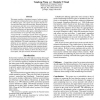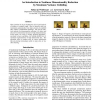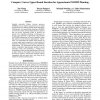AAAI
2006
14 years 1 months ago
2006
This paper proposes a design for our entry into the 2006 AAAI Scavenger Hunt Competition and Robot Exhibition. We will be entering a scalable two agent system consisting of off-th...
AAAI
2006
14 years 1 months ago
2006
The Predictive Linear Gaussian model (or PLG) improves upon traditional linear dynamical system models by using a predictive representation of state, which makes consistent parame...
AAAI
2006
14 years 1 months ago
2006
Reinforcement learning problems are commonly tackled with temporal difference methods, which attempt to estimate the agent's optimal value function. In most real-world proble...
AAAI
2006
14 years 1 months ago
2006
Several researchers have illustrated that constraints can improve the results of a variety of clustering algorithms. However, there can be a large variation in this improvement, e...
AAAI
2006
14 years 1 months ago
2006
This paper considers a distributed system of software agents who cooperate in helping their users to find services, provided by different agents. The agents need to ensure that th...
AAAI
2006
14 years 1 months ago
2006
AAAI
2006
14 years 1 months ago
2006
People frequently use the world-wide web to find their most preferred item among a large range of options. We call this task preference-based search. The most common tool for pref...
AAAI
2006
14 years 1 months ago
2006
AAAI
2006
14 years 1 months ago
2006
AAAI
2006
14 years 1 months ago
2006
Partially observable Markov decision processes (POMDPs) are an intuitive and general way to model sequential decision making problems under uncertainty. Unfortunately, even approx...



